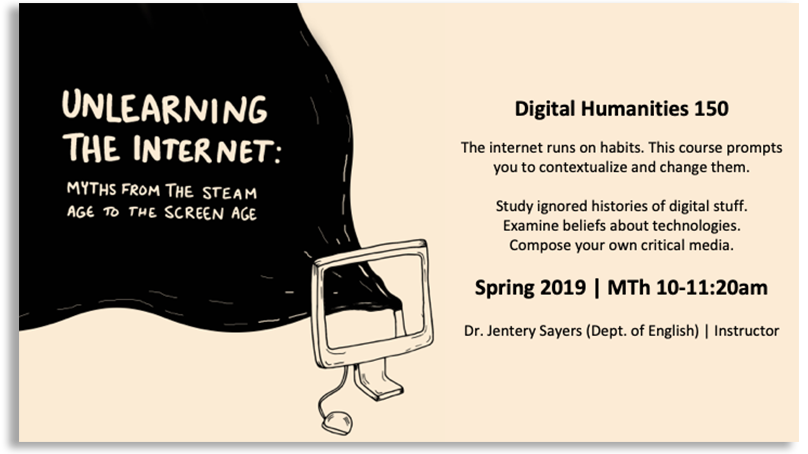Unlearning the Internet
Designed for 108 students across the disciplines, “Unlearning the Internet” (Spring 2019) was an undergraduate course about how social norms and cultural histories shape habits of internet research and communication. I asked students to engage these norms through weekly case studies and workshops about how, for whom, by whom, and under what assumptions the internet is made. Topics included the myth of lone male inventors, the rhetoric of raw data, the ostensible autonomy of algorithms, and the ideology of cyberspace as a landless territory.
The course concluded with a “festival” on campus, where students shared their own zines on the course theme. Many of the zines combined cultural criticism with pedagogies of the internet.
This course was the fifth introduction to digital studies I’ve taught at UVic. While, in the first few introductions, I focused on teaching software, programming, and academic debates, “Unlearning the Internet” gravitated toward tool-agnostic practice, historically informed design, and flexible strategies for addressing technologies with labor and culture in mind. Most of the workshops, for instance, relied on low-tech approaches and paper prototyping.
The official description of “Unlearning the Internet” is below, together with a link to the course website, my notes, the syllabus in PDF, and posters for both the course and the zine fest. I want to thank teaching assistants, Stefan Higgins, Ria Karve, and Ian Michael Waddell, for working with me on this one.

Unlearning the Internet
Spring 2019 | UVic DHum 150 | Undergraduate course for 108 students
Links: course website (HTML); syllabus (PDF); notes (HTML); course poster (JPG; by Danielle Morgan); zine fest poster (PDF; by Danielle Morgan and me)
The internet runs on habits. This course prompts us to change them from the inside. We will study ignored histories of digital stuff, examine dominant beliefs about technologies, and compose our own content, from audio and images to visualizations and websites. Each week will be dedicated to a popular misconception, such as the fallacy of automation and the myth of the lone male inventor, all with the goal of making critical media, with the past in mind, in the present moment.
Technical competencies assumed: know how to send an email.
For more information, visit the course website.
Poster and featured image by Danielle Morgan. Both used with permission. I created this page on 19 June 2019 and last updated it on 30 January 2022.